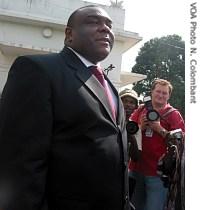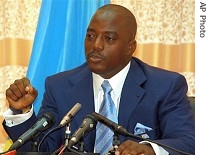Democratic Republic of Congo opposition leader Jean Pierre Bemba has talked about leaving the country, and recent reports say he could soon be flown to Portugal for health care. Bemba is in the South African Embassy in the capital Kinshasa, where he sought refuge when fighting broke out between his militia and Congolese army forces last week. Kari Barber has more from VOA's West and Central Africa bureau in Dakar.
While Congolese wait to learn whether former Vice President Bemba will be leaving the country, some analysts are expressing concern that Bemba's departure could hinder the development of a healthy political system, one that tolerates criticism and opposition.

Jean-Pierre Bemba
Local journalist Eddy Isango says members of Bemba's party have confirmed they are negotiating for Bemba to leave the country.
Isango says Bemba may be looking for special permission to seek care in Portugal for an injury he suffered when he fell down stairs last winter. Isango says without a special visa issued by the Red Cross or another similar organization it is unlikely the government would allow Bemba to leave.
An arrest warrant was issued Friday for Bemba, accusing him of treason after his refusal to dissolve his militia and integrate it into the national forces, which led to two days of deadly clashes between the militia and the army in the capital.
Many of Bemba's guard are now said to have handed themselves over to be integrated into the army.
 |
| Joseph Kabila holds press conference in Kinshasa, 26 Mar 2007 |
"This is no resolution at all," he said. "It may mark the beginning of the end of the opposition. There is no single individual in the opposition today that has the charisma of Mr. Bemba to lead the opposition."
Kodi says a vibrant opposition is necessary for the healthy development of the nation as a democracy.
He says he worries that some in Mr. Kabila's party would take advantage of the opposition's lack of leadership to weaken it as a political force.
Kodi says that Mr. Kabila and the international community will need to make a special effort to guarantee that all freedoms and rights are respected.
"So the future really depends on how much the international community puts pressure on President Kabila to give some room to the opposition and to uphold the freedom of expression that is enshrined in the constitution of the country," he added.
Earlier this week, European Union ambassadors condemned what they said was an excessive use of government power during the two days of fighting and called on Mr. Kabila's government to work to assure democracy and freedom of expression.
Michel Nourredine Kassa works with politicians and leaders in the Democratic Republic of Congo to establish dialogue and encourage ideas of power sharing. He says the idea of power sharing has been difficult for the politicians to accept.
"I think what has been plaguing the whole peace process in this country is some kind of a zero-sum gain logic," he explained. "Whereby if I win, I need to win totally and you need to lose totally."
Kassa says he has not given up hope that dialogue could bring the two parties together to work peacefully.
As a senator, Bemba is entitled to immunity from the charges against him, unless the parliament chooses to lift the immunity.
Related articles
- • European Union Sanctions Rwanda and M23 Officials over Congo Conflict (March 17, 2025)
- • Canada and Germany Impose Sanctions on Rwanda for Supporting M23 Rebels (March 4, 2025)
- • European Union Suspends Defence Consultations with Rwanda (February 24, 2025)
- • Felix Tshisekedi Sworn In as DR Congo President (January 24, 2019)
- • Constitutional Court Declares Tshisekedi Winner of Presidential Election (January 19, 2019)
- • Felix Tshisekedi Vows to Be the President of All Congolese (January 10, 2019)
- • Felix Tshisekedi Elected DR Congo President (January 10, 2019)
- • DR Congo Delays Results of December Election (January 6, 2019)
- • Botswana Urges Joseph Kabila to Step Down (February 26, 2018)
- • No elections in DR Congo in December without electronic voting machines: INEC (February 13, 2018)
- • US Warns DR Congo Against Electronic Voting for Delayed Election (February 12, 2018)
- • Felix Tshisekedi accuses INEC of illegally prolonging Kabila's mandate (October 24, 2017)
- • DRC Seeks Arrest of Presidential Candidate Moise Katumbi (May 19, 2016)
- • Papa Wemba Is Buried in Kinshasa (May 4, 2016)
- • Papa Wemba Awarded Highest National Honor as Thousands Pay Tribute (May 2, 2016)
- • Rights Groups: DR Congo Must Free Pro-democracy Activists (April 13, 2015)
- • Police Open Fire on Crowd Protesting Election Law Change (January 19, 2015)
- • Denis Mukwege Wins Sakharov Prize 2014 (October 21, 2014)
- • Etienne Tshisekedi Evacuated to Belgium for Medical Treatment (August 16, 2014)
- • Kerry Calls on Kabila to Honor Constitution (May 4, 2014)
- • Kerry in DR Congo for Security Talks (May 3, 2014)
- • DR Congo Takes Chairmanship of COMESA at Summit in Kinshasa (February 26, 2014)
- • New DR Congo amnesty law welcomed by UN envoys (February 5, 2014)
- • DR Congo Honors Nelson Mandela, Hero and Model for Humanity (December 6, 2013)
- • Congo Army Takes Control of Mbuzi Hill From M23 Rebels (November 4, 2013)
- • Kabila Congratulates Congo Army for Defeating M23 Rebels (October 30, 2013)
- • UN Security Council debate focuses on peace efforts for Africa's Great Lakes region (July 25, 2013)
- • DR Congo Eases Process for Starting a New Business (June 3, 2013)
- • Regional Leaders Sign DR Congo Peace Deal (February 24, 2013)
- • The M23 Rebels Want to Overthrow Kabila? Nonsense (November 28, 2012)







